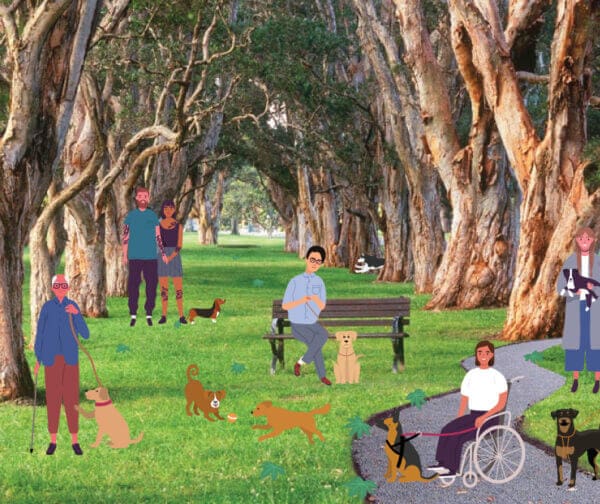
7 Facts About Guide Dogs
7 Facts About Guide Dogs
Guide dogs are assistance dogs that are trained to guide blind and low-vision people around obstacles. Guide dogs have a very important job to do and are probably even more clever than you think! Check out these 7 facts below.
1. Intelligent Disobedience
A guide dog will always stop at a cross walk or intersection. The owner must then listen to the traffic and determine when it is safe to cross because the dog can’t tell when a light is green or red. The owner will then instruct the dog to walk. But, if the guide dog believes that walking would put the owner in harm’s way it will purposely disobey the instruction.
2. Overhead Awareness
Many guide dogs have the ability to recognize overhead obstructions for their owner. A guide dog has the ability to identify obstacles at head height which a cane would not be able to identify. For example, if there is a low hanging tree branch, a guide dog will guide their handler around the obstacle.
3. Different Breeds and Personality Traits
The most popular breed of guide dog is a Labrador. However, other breeds of dogs are also used including, Golden Retrievers and German Shepherds. The breed being used often depends on the individual training school. Sometimes certain dog breeds are crossed to create a dog that has the desirable personality traits of each breed. Labradoodles (a cross between a Labrador and a poodle) are a common crossbreed to provide guide dogs with less shedding for people who have allergies.
4. Guide Dogs are allowed almost anywhere
Despite several regulations and rules prohibiting animals in restaurants and other public places, in many countries, guide dogs are allowed almost everywhere with their owner. However, there are a few exceptions to this. For example, if an assistance dog owner wanted to visit someone who was in an Intensive Care Unit at a hospital it would be reasonable for the guide dog to be denied access due to hygiene and infection control policies.
5. Guide Dogs are different on and off harness.

When guide dogs are wearing their harness they know they need to work and be well-behaved. However, a guide dog can be very different when their harness is off. They can play, socialize and relax just like any other family dog. It’s also very important to never pat someone’s guide dog when it is wearing its harness as a distracted guide dog can be a safety risk for their handler who is relying on them.
6. Not all dogs will graduate Guide Dog puppy school.
Not all dogs can become guide dogs. This can be because of health reasons, behavior or temperament. This does not mean that the dogs that don’t graduate won’t make wonderful pets. Dogs that don’t graduate often stay with the owner that raised them as a puppy or are adopted by another loving family.
7. Guide Dogs Retire
Guide dogs will usually retire from work at around the age of 10 or 11. Just like any dog at this age, they will often be showing signs of ageing, such as arthritis. Sometimes a guide dog will begin to show signs it needs to be retired. Most guide dogs are very excited when they hear their harness. But if they begin to avoid their harness and not want to put it on, it is often a sign that they are no longer up to full working life and need to be retired.
When a guide dog retires, it will often stay with their owner, family or friends, but if this is not possible, the dog is re-homed to new owners, where the dogs can enjoy their hard earned retirement. Sometimes the dog is even able to be re-homed with the original people who raised it during its puppy years before guide dog school.


